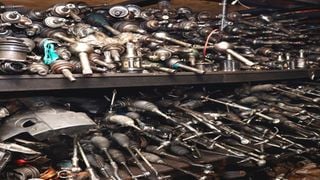
Spare parts at a shop. FILE PHOTO | NMG
|Business
Premium
Japanese auto giant shakes Kenya’s car spare parts market
Japanese trading firm Kaiho Industry Co. Ltd will on Wednesday next week launch Kenya’s first second-hand motor vehicle spare parts auction in Nairobi, a move that is expected to save motorists and garages the time and cost of importation.
Kaiho, which is being supported by the Japan International Cooperation Agency (JICA), will also offer parts traceability to differentiate itself through the quality of its products.
“The used vehicle spare parts auction will start on April 3. The first auction will run for three days and the frequency will thereafter depend on market dynamics,” said a source.
“The auction will save consumers time taken to import parts that can be two weeks or more. It will also bring quality in a market where the reliability of sensitive parts like engines is uncertain.”
The multinational has set up shop in Atlantis Business Park close to Nairobi’s Internal Container Depot (ICD). Customers will be required to register and bid online, with winners later taking delivery of parts.
Participants will pay different deposit rates that will be refunded if their bids fail. Winners will use their deposits as part of their payment for the parts.
The auction model differs from the existing practice where customers and shop owners negotiate the price of parts. Those importing directly pay the price stated by the overseas traders.
The entry of Kaiho, one of Japan’s leading used automotive parts suppliers, comes soon after President William Ruto’s visit to the Asian country last month where Tokyo and Nairobi agreed on several trades, economic and diplomatic programmes.
More Japanese multinationals are expected to invest here in the short term, with the Kenyan government having earlier announced plans to establish a used car market in Naivasha targeting buyers from the local and regional markets.
The used car market is expected to open next month. Kaiho will stock parts of Japanese and some European motor vehicle brands.
Japanese brands led by Toyota are, however, the most popular on Kenyan roads and account for at least 90 percent of all vehicles sold in Kenya per annum, according to official data.
Most motorists and small businesses use second-hand spare parts to keep their vehicles on the road, with the bulk of the components sourced from Japan and the United Arab Emirates.
Kaiho, which has ambitions to sell up to 10 containers of spare parts per week, will raise competition in a market dominated by individuals and small businesses concentrated in downtown parts led by Nairobi’s Kirinyaga Road.
The Japanese firm will offer a limited warranty on engines and gearboxes, some of the most expensive and sensitive vehicle parts.
This marks a significant change in the current trade practice where such parts may not be returned to the seller or may be returned at the cost of forfeiting a substantial fraction of the purchase price if they are defective.
The popularity of used spare parts has been linked to the price-conscious middle class and small businesses as well as the major mark-ups charged by new vehicle dealers.
The high depreciation of used vehicles, ranging from 65 percent to 90 percent in most cases, also discourages the use of new parts that can rival the residual value of automobiles in the case of big-ticket items such as engines and gearboxes.
Vehicles have many parts, with the cost of used components ranging from less than Sh1,000 to hundreds of thousands of shillings.
Kaiho is entering a vibrant and growing market that is worth billions of shillings. Official statistics show that 12,302 people were employed in the sale of motor vehicle parts and accessories in 2022.
Earnings in this sector grew to a new peak of Sh5.9 billion in the review period, rising from Sh5.5 billion in the prior year though a large part of the trade is not captured on official data.
An additional 93,950 vehicles, including passenger cars and trucks, were registered in the country last year, expanding the number of clients that will need parts for years.
Kaiho already eyes expansion by setting up shop in Naivasha’s Special Economic Zone (SEZ) a move that will see it benefit, for instance, by not being required to register for value-added tax.
Kenya is among the countries that are expected to continue relying on internal combustion engines as developed economies lay plans to switch to electric transport in the decades ahead.





